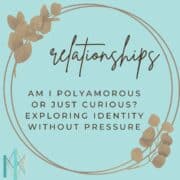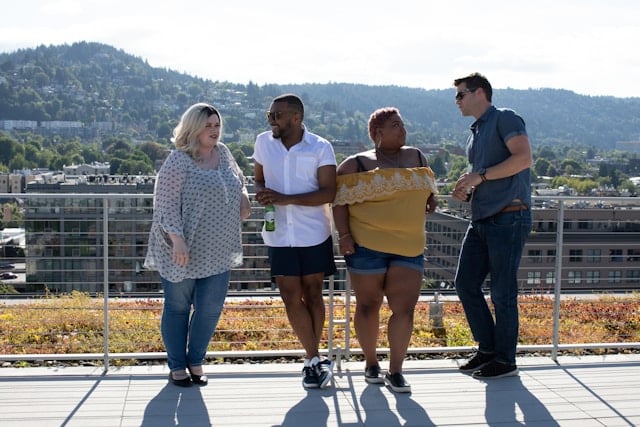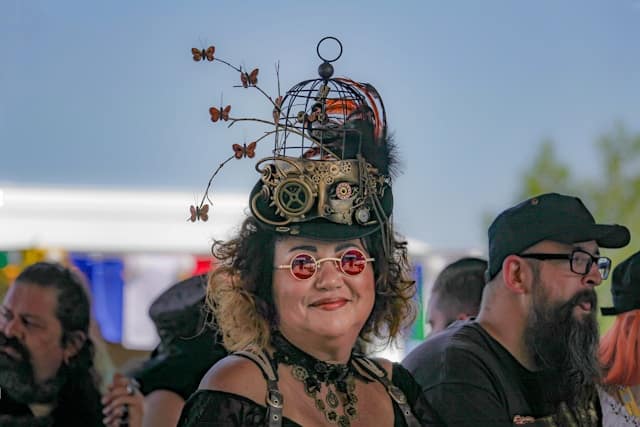
For many people, the path to understanding their relationship orientation isn’t linear. You might be in a monogamous relationship but find yourself wondering about other possibilities. Or maybe you’ve always felt that monogamy doesn’t quite fit—but you’re unsure whether that means you’re polyamorous, simply open to exploration, or somewhere else on the spectrum.
It’s common to feel uncertainty, curiosity, even confusion while navigating this space. Therapy can offer a supportive, nonjudgmental container to explore those questions at your own pace—without pressure to label yourself right away.

Why Are So Many People Questioning Monogamy?
We live in a culture that overwhelmingly normalizes monogamy—in media, religion, law, and family systems. For many, monogamy is never questioned because it’s assumed to be the default. But increasingly, people are beginning to ask: Is this actually the right fit for me?
These questions might surface during moments of relationship dissatisfaction, personal growth, or exposure to alternative relationship models through friends, books, or online communities. You might wonder:
- Is it possible to love more than one person at once?
- Do I want more emotional or romantic freedom in my relationships?
- Why do I feel stifled, even in healthy monogamous relationships?
- Am I craving novelty, connection, or something deeper?
- Do I feel dishonest when I have crushes, fantasies, or attractions while partnered?
These questions don’t necessarily mean you’re polyamorous. They might reflect a deeper inquiry about values, autonomy, or unprocessed relationship trauma. They may also signal that you’re ready to reevaluate how your relationships are structured, whether or not you ultimately identify as non-monogamous. Exploring these questions with a therapist trained in relational diversity can help you distinguish between what’s externally conditioned and what’s authentically you.
Common Reasons People Begin Exploring Polyamory
Everyone’s story is different, but here are some common motivators for questioning monogamy. These are not universal, nor are they definitive signs of being polyamorous. Instead, they can be entry points to deeper self-understanding.
You’re Feeling Emotionally Constrained in Monogamy
Some people find that monogamy, while emotionally safe and culturally familiar, feels emotionally or creatively limiting. You may love your partner deeply but still feel like your emotional or sexual needs aren’t fully met in one relationship. This doesn’t necessarily mean something is wrong with your relationship; it could be a clue that your relational orientation might include capacity for multiple loving connections.
You’re Curious, Not Committed (Yet)
Curiosity is a valid and important reason to explore. You might be intrigued by non-monogamous frameworks you’ve read about or heard from friends. Maybe you’re wondering how it would feel to date multiple people, or you want to understand your own desires more clearly. Exploration doesn’t require commitment to a particular identity. It can be a stage of gathering information and checking in with your body, emotions, and values.
You’ve Experienced Multiple Loves Before
If you’ve ever found yourself emotionally connected to more than one person at a time—even without acting on it—you might be questioning whether you naturally form multiple attachments. You might look back on past experiences of “falling for someone new” while still loving a current partner, and feel like monogamy asked you to repress, hide, or end something unnecessarily.
You’re Seeking Autonomy or Self-Discovery
Some people explore non-monogamy not just for relational reasons, but as a way to reclaim autonomy, resist societal norms, or deconstruct internalized beliefs. Polyamory can be part of a broader life inquiry: What kind of freedom do I want? How do I want to be in connection with others? Do I want to live a life defined by internal values rather than external rules?
You’re Healing from Past Relationship Wounds
For some, curiosity about non-monogamy emerges after painful experiences in monogamous relationships: betrayal, codependence, emotional control, or lack of communication. In these cases, non-monogamy can appear as an alternative that might feel safer, freer, or more honest. But it’s important to explore this carefully, ideally with a trauma-informed therapist, to ensure your interest in polyamory is coming from a place of healing rather than reaction.
Exploring Non-Monogamy in the San Francisco Bay Area
The San Francisco Bay Area has long been recognized as a hub for progressive thought, expansive relationship models, and inclusive communities. From queer nightlife and polyamory-friendly meetups in San Francisco, to social justice–oriented relationship workshops in Oakland, to mindfulness-based personal growth circles in Berkeley, this region fosters space for people exploring beyond traditional monogamy.
If you’re questioning your relationship orientation, the Bay Area offers more than just acceptance—it offers community. There are local support groups, educational events, book clubs, and therapist networks that center non-monogamous, queer, BIPOC, and neurodivergent voices. It’s a unique environment where many clients feel less isolated as they navigate identity, complexity, or transition.
However, this openness can come with its own pressures—especially if you’re new to non-monogamy. You may feel like you’re “supposed” to have it all figured out because you’re in a city known for sexual and relational liberation. Therapy offers a chance to slow down, tune in, and process your exploration without expectation.
Our practice is based in the Bay Area, and our therapists understand the cultural nuances that come with living here. Whether you’re in San Francisco, Oakland, the East Bay, the Peninsula, or beyond, we’re familiar with the local landscape of polyamory, consent culture, LGBTQIA+ community, and relational diversity. We’re also attuned to the emotional challenges that can arise—especially for BIPOC, trans, and neurodivergent clients navigating systems that were not designed with them in mind.
If you’re seeking therapy that honors the richness of your relationships and the complexity of your identity, you’re in the right place—and the right city.
Therapy Can Help You Explore Without Pressure
Many people feel a sense of urgency or confusion when beginning to question their relationship orientation. You might worry that you’re being dishonest by not having clarity. Or you may fear hurting your current partner if you express your curiosity. Therapy offers a container to slow things down.
Clarifying Desires vs. Fears
It’s normal to conflate desire with discomfort. Maybe you fantasize about more than one partner, but fear losing emotional safety. A therapist can help you parse out what you truly want versus what you’re afraid of losing. This clarity often brings relief, even if it doesn’t immediately answer the question of identity.
Exploring Parts of You That Hold Conflict
Approaches like Internal Family Systems (IFS) can help you identify and work with the different “parts” of yourself that hold conflicting perspectives. One part of you may long for expansion, while another fears rejection or loss. Naming and giving voice to these parts allows you to move toward integration and compassion.
Processing Guilt or Shame
For those raised in religious or conservative households, or who carry internalized cultural expectations, the idea of non-monogamy may come with guilt or shame. Therapy can help you examine those beliefs, understand where they came from, and choose whether they still serve your current values.
Making Room for Fluidity
Some people discover that their identity is not fixed. They may practice monogamy for years, then non-monogamy, then shift again. Fluidity is not confusion—it’s a reflection of growth, experience, and evolving needs. Therapy creates space for you to be in process, rather than rushing to a permanent label.
Learning to Communicate What You Discover
As you learn more about your relational orientation, you may need to have new or vulnerable conversations with partners. Therapy can help you prepare for these discussions with clarity, empathy, and confidence. Role-playing, scripting, and grounding practices can make these conversations more manageable.
You Don’t Need a Label to Start Healing or Growing
Many clients come into therapy hoping to walk away with a definitive answer: “Am I polyamorous or not?” But relational identity doesn’t always arrive in black-and-white terms. Sometimes, it reveals itself slowly, over time, through reflection and real-life experience.
What matters most is not choosing the “right” label, but living in alignment with your values and emotional truth. You might find yourself drawn to some aspects of polyamory—like emotional honesty or autonomy—while ultimately choosing a monogamous structure. Or you may step fully into non-monogamy and find new levels of connection and growth.
The goal of therapy isn’t to define you, but to support your unfolding. It’s a space where you get to ask the deeper questions, hold the uncertainty, and move toward the relationships you truly want—with self-awareness, consent, and care.
Finding the Right Therapist for This Work
Exploring polyamory, curiosity, and identity is complex, personal work. It deserves a therapist who can meet you with openness and nuance. At the Center for Mindful Therapy, our San Francisco Bay Area clinicians are experienced in working with:
- Non-monogamy and polyamory-affirming care
- LGBTQIA+ and gender-diverse clients
- Trauma-informed approaches to relationship exploration
- Somatic therapy for working with anxiety and emotional dysregulation
- Mindfulness and transpersonal psychology for identity development
- Internal Family Systems (IFS), Gestalt, and other integrative methods
Whether you’re beginning to explore or seeking ongoing support, we’re here to help you navigate this journey with respect, compassion, and clarity.
Interested in working with a therapist?
Browse our Therapist Directory
You Might Also Like to Read:
Affirming Care from Our San Francisco Trans, Non-Binary, and Queer Therapists
Therapist Book Review – Divergent Mind: Thriving in a World That Wasn’t Designed for You





